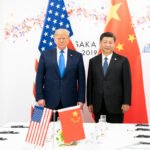
Before US President Donald Trump and Chinese President Xi Jinping meet on Thursday in Busan, South Korea, the United States and China will not settle all of their differences.
However, they are probably going to make enough headway on issues like US export restrictions, China’s grip on strategic minerals, and other annoying issues to calm financial markets and keep their rivalry from causing much more economic harm for the time being.
“They’re trying to get to some kind of détente. There’s no pretence that they’re going to reach a grand bargain that solves everything in the relationship,” said Jeff Moon, a former US trade official and diplomat who now runs the China Moon Strategies consultancy.
Over the weekend, the two nations gave assurances that they were drawing closer to a trade deal.
Li Chenggang, China’s top trade negotiator, informed reporters that a “preliminary consensus” had been struck between Beijing and Washington. There was “a very successful framework,” according to US treasury secretary Scott Bessent.
Chinese officials “want to make a deal and we want to make a deal,” according to Trump, who voiced confidence.
Prior to this weekend’s talks in Kuala Lumpur, Malaysia, US and Chinese negotiators had met four times this year, in Geneva in May, London in June, Stockholm in July, and Madrid in September. However, they had only succeeded in reaching a truce to prevent rising tariffs and a vague deal “framework,” not anything substantial.
According to calculations by Chad Bown of the Peterson Institute for International Economics, Trump had threatened to impose an additional 100 percent tariff on Chinese goods on Nov 1, on top of an already high 57.6 percent, as fresh tensions increased earlier this month.
However, Bessent said on CBS’s “Face the Nation” on Sunday that those harsh triple-digit tariffs are “effectively off the table” while negotiations continue, indicating that the two nations are moving along.
The main point of disagreement between the two largest economies in the world is:
China’s rare earth leverage
China is the world’s top producer and processor of rare-earth minerals and associated technologies, which are essential for electric cars, robotics, fighter jets, and a variety of other high-tech goods. The nation has restricted exports of the elements, damaging US and other foreign businesses, as a show of strength and the influence it brings to the negotiating table. Most recently, on Oct 9, right before the Trump-Xi summit, they increased the restrictions.
“Rare earths are now the most effective lever that China can pull. The rest of the world does not have readily available or affordable productive capacity,” said Zongyuan Zoe Liu, senior fellow at the Council on Foreign Relations.
To challenge China’s domination, the US and other nations are making significant investments in rare earths, but it might take years for those efforts to pay off. Liu said, “They realize this is not a lever they can pull forever. So they want to use it when it actually hurts.”
Bessent remarked on ABC Sunday that he anticipated China will “delay” the export restrictions on rare earths “for a year while they reexamine it.”
The prospect of additional Chinese restrictions on rare earths will always loom over America until a new supply is established, according to Pini Althaus, who started USA Rare Earth back in 2019 and is currently working to develop new mines in Kazakhstan and Uzbekistan as CEO of Cove Capital. According to Althaus, “The United States must urgently build independent critical minerals supply chains.”
Meanwhile, trade will be the topic of discussion when Trump and Xi meet this week. However, there is also a chance to secure the release of American citizens who are being detained by China.
The Foley Foundation, which supports American hostages and others wrongfully being detained abroad, estimates that there are 200 Americans incarcerated in China, more than in any other nation. The majority are thought to be ethnic Chinese Americans who have been imprisoned for allegedly endangering China’s “national security” after falling victim to Beijing’s stringent security measures.